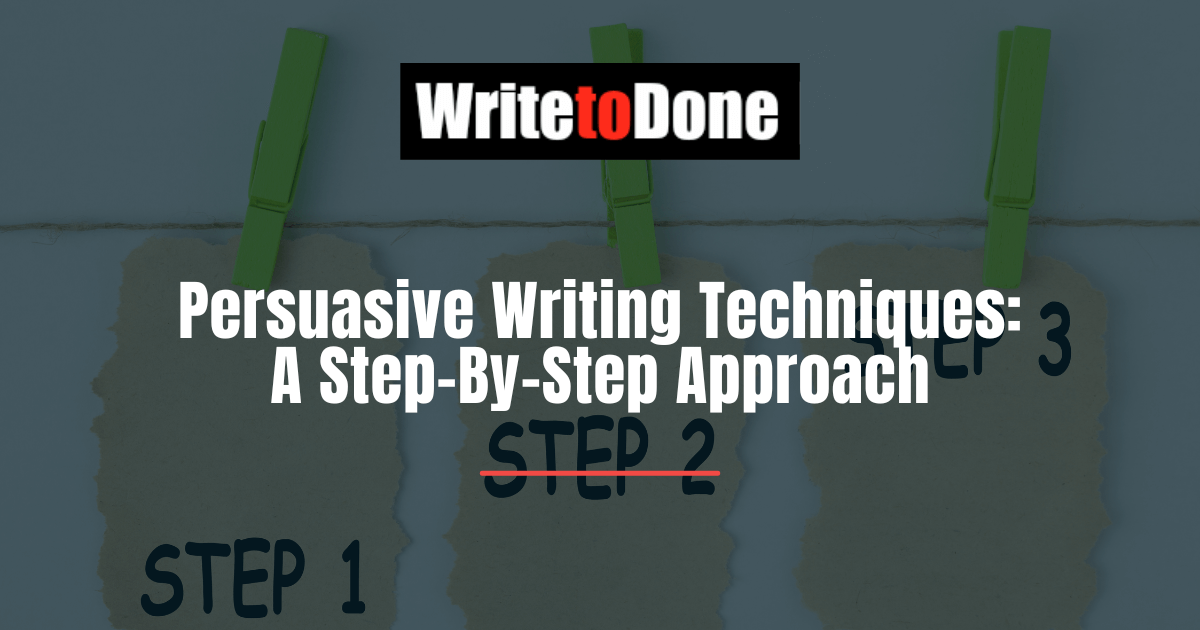If you’re a writer, you need to be able to use persuasive writing techniques.
After all, you want people to read what you write. And maybe you want them to buy your book or article.
There’s more than one way to win an argument.
Ancient Greek philosopher and polymath Aristotle developed his own philosophy on the best way to beat an opponent using words. He called this rhetoric.
Rhetoric, Aristotle said, is “the ability, in each particular case, to see the available means of persuasion.”
The three main means of persuasion are:
- Reason – appealing to your audience’s rationality and logic. Giving your point of view in an informed and fair manner.
- Emotion – creating feelings in your audience that lead them to your point of view.
- Beliefs – using the values and beliefs of your audience to build your argument.
You can use all of these for persuasive writing techniques.
Of course, just because a tool is available to you doesn’t mean you should use it. Different persuasive approaches will be more successful depending on the situation.
Want to show your point of view is the correct one? Use reason. Want to motivate your audience to take action? Use emotion. Trying to get your audience to care? Use beliefs and values.
In this blog post, I outline a step-by-step approach to using persuasive writing techniques.
So, what’s the best way to make a rational argument?
PEEL: Point, Evidence, Evaluation, Link
You can apply the PEEL technique – originally designed to make academic writing more compelling persuasive, and easy to read – to your blog writing, journalistic writing and nonfiction books.
This technique makes your argument easy to follow and helps the reader see you are giving a fair and balanced point of view.
The ultimate authority must always rest with the individual’s own reason and critical analysis.
~ Dalai Lama
Point
In the opening sentence, make your point. This is also known as the topic sentence, as it introduces the topic you’re about to discuss.
Evidence
In the next one or two sentences, give evidence to expand upon and support the point you made. Evidence can include statistics, research findings, and quoting an authority or a primary text, such as the Bible or classic literature. Depending on the type of writing and the audience you’re writing for, you can also use anecdotes and stories from history and your own experience.
Evaluation
In the following sentences, you evaluate the merits of your point and any evidence against it. This shows you’re willing to engage with other points of view, and rather than undermining your argument, it serves to strengthen it.
Your evaluation can include research findings that contradict the evidence you provided, quoting authorities who disagree with you. Again, it can include anecdotes and stories.
Link
Finally, link your point to the point you’ll make in the next paragraph.
As well as giving a good flow to your writing, this helps you create a good overall structure as paragraphs on similar themes naturally end up together.
(N.B. As paragraphs in blog posts are shorter, the PEEL technique can cover several paragraphs or even a whole blog post. Bloggers can Link to the overall theme of the blog, or give a taster of what they’ll be writing about next).
There is no greater misfortune in the world than the loss of reason.
Mikhail Bulgakov
Persuasive Writing? Over to you…
- Do you use reason as a persuasive writing tool?
- What methods do you use to make a rational argument?
- Did you notice the PEEL structure in the opening section of this blog post? Go take a look to see how it works.
David Masters is a freelance writer and storyteller helping the world tell powerful stories at inkably.
Click here to enjoy the related article: Persuasive Writing Techniques: 7 Tips.
















